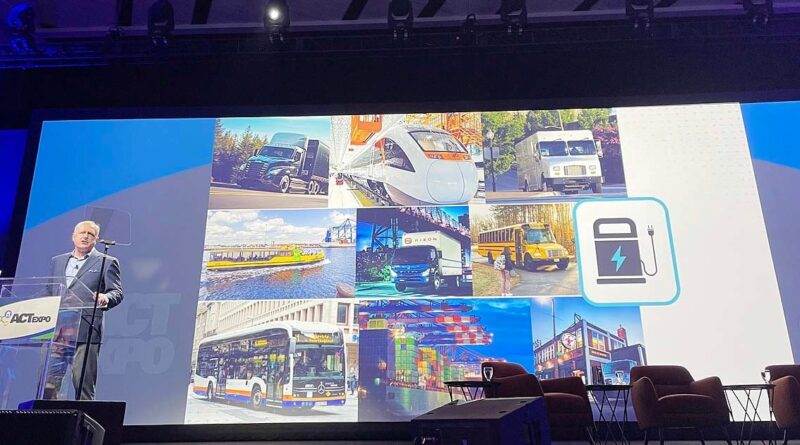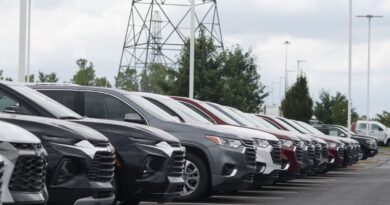Trucking, freight companies face EV charging, hydrogen fueling gaps as they electrify their fleets
ANAHEIM, Calif. — If enough chargers were available along U.S. roads, a single-digit order for the Freightliner eCascadia electric Class 8 tractor could have multiplied to hundreds.
“We’ve had people say, ‘Hey, we love the five that we took delivery of, and if we had a way to charge them, we would take 200 more,’ ” John O’Leary, CEO of Daimler Truck North America, which owns Freightliner, told Automotive News at the ACT Expo here. ACT stands for Advanced Clean Transportation.
Freightliner is one of many trucking companies confronting a lack of charging and hydrogen fueling infrastructure as they integrate green trucks into their fleets.
The pandemic-era supply chain tangles have loosened, skeptical freight owners have growing confidence in the technology, and manufacturing plants are operating at full speed. But the big truck manufacturers displaying their vehicles at the expo articulated a frustrating bottleneck: Customers want to install chargers in their depots and lots, but the wait for electrical service for charger installation is in some cases multiple years. That can discourage potential vehicle buyers.
The process of getting power to depots and other sites for commercial fleets differs by state, but usually it requires site inspection, design, permitting and construction. O’Leary also described a two- to three-year back order for the switch gear required for utilities to extend power.
Components shortages are a lingering effect of COVID-19 supply chain issues but also the result of mergers and acquisitions in the sector, said Jackie Piero, U.S. head of policy at Mobility House, a company that has created software and hardware used to limit energy use for electric vehicle chargers, a way of getting around grid constraints.
There’s “been industrial consolidation that just resulted in a little more rigid supply chain system, and now we’re having a huge rise in demand, and we’re just not necessarily ready to meet it,” said Piero.
Truckmakers and tech companies are stepping in to fill the void.
Daimler Truck, for example, said last week that it was collaborating with BlackRock Alternatives and NextEra Energy Resources to build a network of chargers for medium- and heavy-duty trucks.
Volvo in February added another vendor to a program that provides charging hardware solutions for buyers interfacing with Volvo Trucks dealers.
Nikola has an agreement with ChargePoint to install chargers across the U.S.
Even manufacturers of hydrogen trucks, which have yet to hit the market, are working to build refueling infrastructure. At the expo, Nikola announced a partnership with Voltera to build up to 50 hydrogen fueling stations over the next five years, and the Daimler charging partnership will also install hydrogen stations.
Truckmakers see a natural opportunity. Installing their own charging infrastructure addresses would-be customers’ concerns. Some truckmakers feel that they simply must find a solution and get back to business.
“No one can afford just waiting,” said Magnus Koeck, vice president of strategy, marketing and brand management at Volvo Trucks North America. “We need to take the customer by the hand.”
Services to support EV charging are also a potential source of revenue for manufacturers. After selling vehicles to fleet owners, truckmakers could cash in on what consulting firm McKinsey & Co. estimates is a $15 billion annual market. That includes revenue from services such as selling power back to the grid at peak demand.
But that opportunity is not without its risks.
Truckmakers are still in relative boom times, said Mike Roeth, executive director of the North American Council for Freight Efficiency, and if the economy dips, they will be on the hook for a complex and cost-intensive service for fleets.
“You get into all this, make all these fancy announcements, and you build it all up, and then all of a sudden your revenue tanks — well, what do you do?” he said. “It’s hard to back out.”
Plus, some EV charging infrastructure partners are struggling to find a workable business model. Not all will make it.
ChargePoint, for example, posted a net loss of $344.5 million on revenue of $468.1 million for the fiscal year ended Jan. 31. For the fiscal year ended Dec. 31, EVgo saw a net loss of $106.2 million on revenue of $54.6 million, and Blink Charging logged a net loss of $91.6 million on revenue of $61.1 million.
“When these truck builders partner with somebody, they’re putting their own truck reputation and market share” on the line, Roeth said. “And they’d better make good decisions.”
Source : Autonews.com




